Table of Contents
▲More homes and businesses are using solar installations in the United States. This means we need more expert people to fix problems with photovoltaic (PV) systems. Knowing how to solve problems with solar panels is very important now.
As we use more solar energy, it’s key to know how to find and fix problems. Keeping your solar system in good shape is important. Learning to fix solar panel troubleshooting issues to save your time and money, and maintain your system well.
Key Takeaways
- Understanding common issues with PV systems is essential for effective troubleshooting.
- Regular check is key for your solar system to work its best.
- Fault-finding skills can save you time and money.
- Spotting problems early can stop bigger issues.
- Good troubleshooting means your solar system works its best.
Understanding Your Solar Power System
A good solar power system works well because of its parts: PV panels, inverters, and combiner boxes. To fix problems, you must know how these parts work together.
Key Components and How They Work Together
Your system has important parts. The PV panels turn sunlight into DC electricity. The inverter changes this DC power into AC electricity, ready for use.
Combiner boxes connect the PV panels to the inverter. They make sure energy moves safely and well.
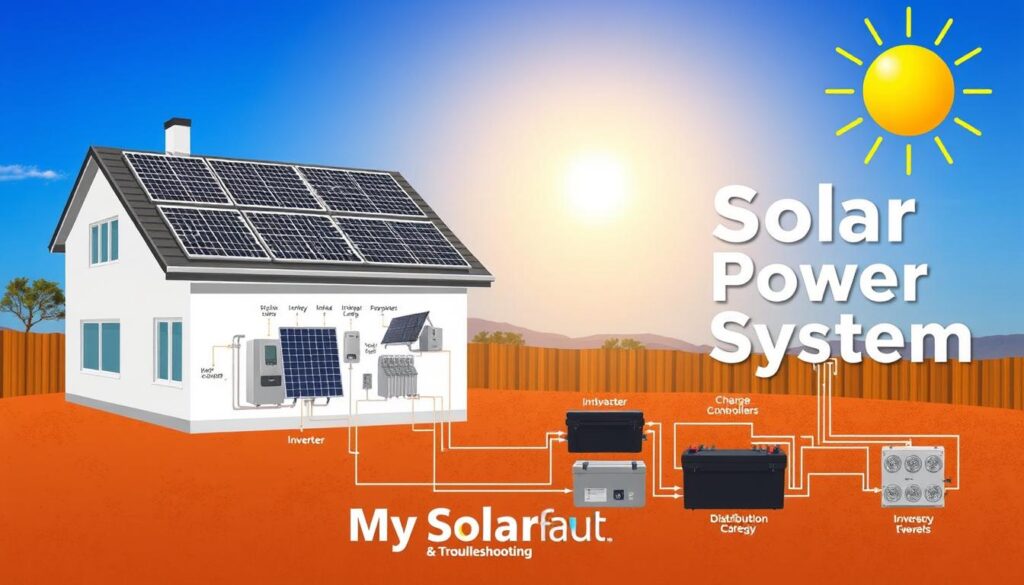
Normal Operating Parameters
Knowing how your system should work is key. Look at energy production, inverter performance, and system voltage. Use apps or your system’s control panel to check these.
Warning Signs of System Problems
Watch for signs of trouble. These can be:
- Energy defict or changing output
- Inverter error messages or fault lights
- Heat build-up or strange noises from parts
- Damage to PV panels or other parts
Identifying these signs early helps fix problems fast. This keeps your system functioning smooothly.
Solar Panel Troubleshooting: Step-by-Step Guide
To get your solar panel system working well, follow this guide. Troubleshooting is key for fixing solar panels and keeping them efficient.
Visual Inspection Techniques
Start by looking at your solar panel system. Check for damage like cracks or broken panels. Also, look for dirt, rubble, or shadows that might hurt performance. A clean and whole system is important for making lots of energy.
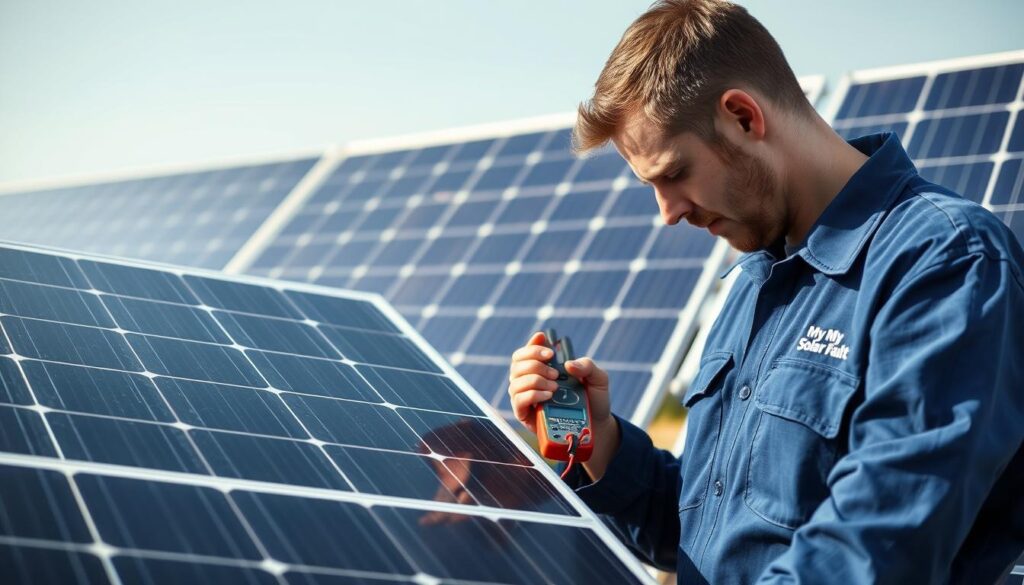
Using Monitoring Apps and Data Analysis
Most solar panel systems have apps for monitoring. These apps show how your system is doing in real time. Look for any alerts or strange energy production. This can help find common solar panel problems.
Testing Electrical Connections Safely
First, make sure you’re safe. Wear the right gear and turn off the system before checking electrical connections. Look for loose or corrosion patches, as they can really slow things down.
Voltage and Current Measurements
Use a circuit tester to check voltage and current from your panels. Compare these numbers to what the maker says. This is important for finding electrical problems.
Continuity Testing
Continuity testing finds breaks in the electrical path. Use a multimeter to test connections in your system. This helps find wiring or connection issues.
Regular solar panel maintenance, including these steps, can stop problems. It helps your system keep making energy well.
Resolving Common Solar Panel Problems
As a solar panel owner, knowing how to fix common problems is key. Solar panels are a big investment in green energy. But, like any complex system, they can have issues. Knowing how to find and fix these problems helps your system work well.
Low Energy Production Issues
Low energy production can happen for many reasons. To solve it, you need to find the main cause. Here are some possible fixes:
- Look for shading and rubble on the panels.
- Check if your panels are degrading.
Shading and Debris Solutions
Shading and rubble can hurt your panel’s performance. Keeping your panels clean and prutrees nearby helps. Make sure your panels are free from dirt, leaves, and other stuff to get the most energy.
Panel Degradation Evaluation
Solar panels can get ineffiecient over time. To check for wear, look for fractures or color changes. If you see a lot of wear, you might need to replace some panels.
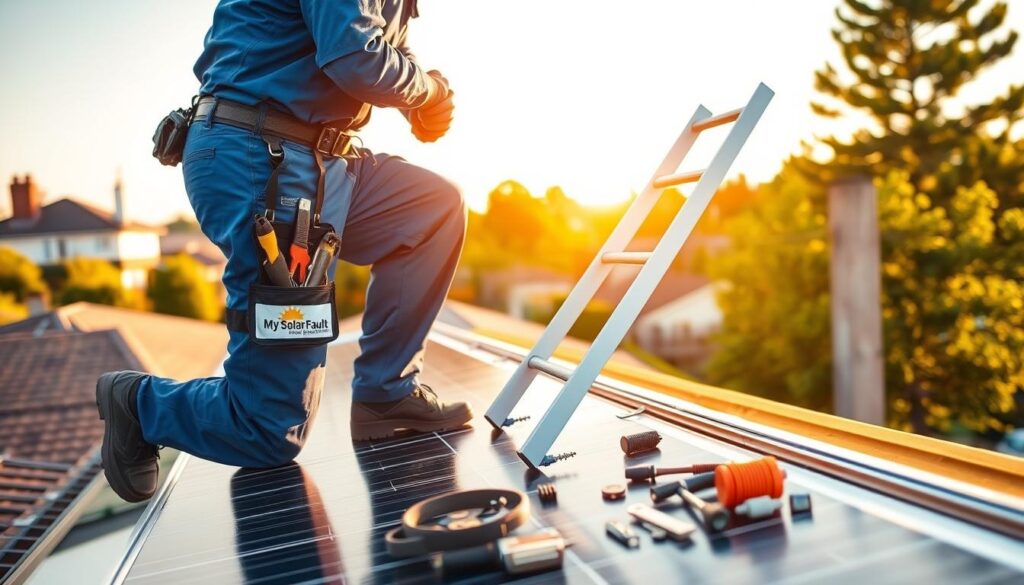
Inverter Troubleshooting
The inverter is key for your solar system, changing DC to AC. Inverter problems can make your system less effective. Here’s how to fix inverter issues:
- Look at the inverter’s display for error codes.
- Use the directions to understand the codes.
Error Code Interpretation
Error codes on your inverter mean specific problems, likepower outages or excessive heat. Knowing these codes helps you find and fix issues. Check your inverter’s directions or ask a pro if you’re not sure about a code.
Reset Procedures
Resetting the inverter might solve the problem. Always follow the maker’s instructions for resets to avoid more issues.
Battery Storage System Issues
Problems with the battery part of your system can affect performance. Issues like less capacity or not charging right are common. Regular checks and monitoring can spot battery problems early.
By fixing these common solar panel problems, you keep your system running well. This ensures it keeps giving you clean, green energy for a long time.
DIY Fixes vs. When to Call a Professional
Knowing when to fix solar panels yourself and when to call a pro is key. DIY fixes can solve many problems. But, for tough issues, a trained tech is best.
Safe DIY Maintenance Procedures
Simple tasks can keep your solar panels working well. For example, removing blocks and cleaning panels can fix small issues. Always turn off the system before you clean or check it.
Dangerous Symptoms Requiring Expert Help
Some signs mean serious problems need a pro. Look out for strange noises, smells, or big drops in power. If you’re not sure or feel afraid of, get a pro.
Finding Qualified Solar Technicians
To find a good solar tech, look for NABCEP certifications. Ask friends or check online reviews for suggestions.
What to Expect from Professional Service
A pro will find the problem, give a detailed report, and fix it. They make sure the job is done right and safely.
Conclusion
To get the most from your solar panels, keep them clean and check them often. Knowing how they work helps site problems early. This way, your panels stay efficient.
Cleaning and checking your panels regularly is key. Look for dirt or damage. Apps and data can help find and fix issues.
Fixing issues early keeps your system working well. If you’re not sure what to do, get help from a pro. They can fix and maintain your solar panels.
Follow the tips in this article to keep your solar system running great. Enjoy the advantages of solar energy and avoid common problems.
FAQ
What are the most common problems with solar panels?
Solar panels often face issues like low energy output and inverter errors. Shading and debris can also be problems. Regular checks can help fix these issues.
How do I troubleshoot my solar power system?
Start by visually inspecting your system. Then, check the data on your monitoring app. Test the electrical connections too.
Also, measure voltage and current. Do continuity tests to find problems.
Why is my solar panel not producing energy?
Shading, debris, or panel wear can stop energy production. Look for blockages or damage. Clean the panels if needed.
Check the panel’s condition. You might need to replace it.
How do I reset my solar inverter?
Follow the user manual for resetting your inverter. Switch it off, wait a bit, then start it again. If problems continue, get professional help.
Can I perform DIY maintenance on my solar panels?
Yes, you can do some maintenance like cleaning and checking the panels. But be careful when working high up. Follow safety rules to avoid shock.
When should I call a professional for solar panel troubleshooting?
If you’re not sure about fixing your panels, or see safety risks, call a pro. They can handle electrical shock and fire hazards.
How do I find a qualified solar technician?
Look for reviews online and ask friends for recommendations. Check if they’re certified by NABCEP.
What are the benefits of regular solar panel maintenance?
Regular maintenance keeps your panels working well. It finds problems early and makes your system last longer.
How often should I inspect my solar panels?
Check your panels twice a year. Or more often if you see problems or after bad weather.
Can shading cause problems with my solar panels?
Yes, shading cuts down energy production. Trim trees or adjust panel position to reduce shading.

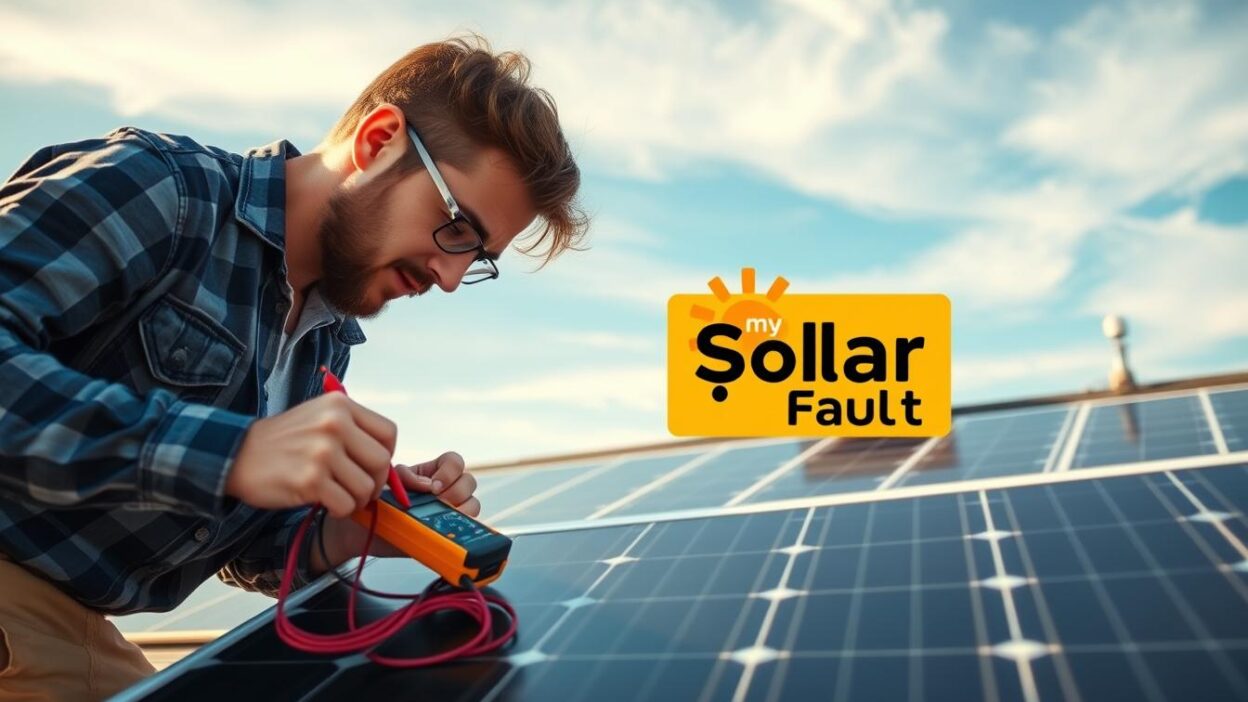
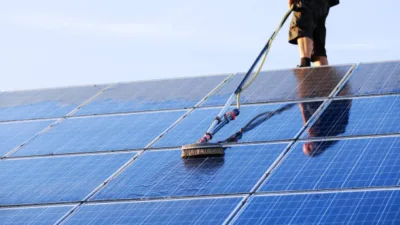
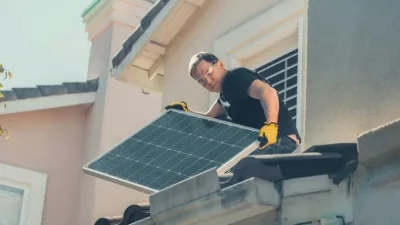
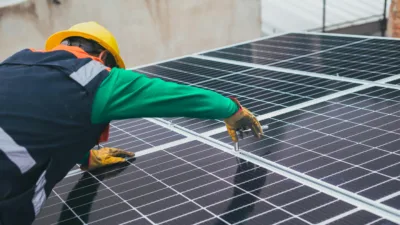
Some truly fantastic posts on this internet site, thank you for contribution. “A conservative is a man who sits and thinks, mostly sits.” by Woodrow Wilson.